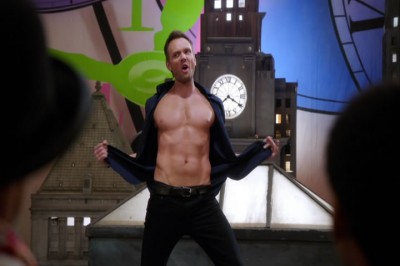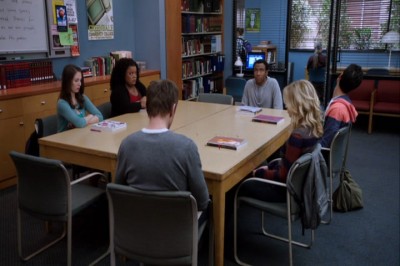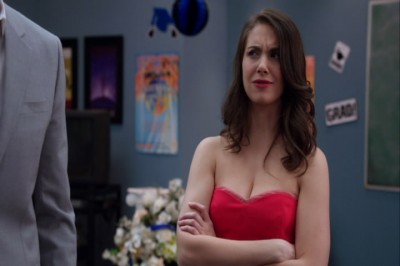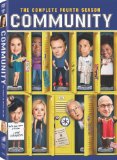| Reviews & Columns |
|
Reviews DVD TV on DVD Blu-ray 4K UHD International DVDs In Theaters Reviews by Studio Video Games Features Collector Series DVDs Easter Egg Database Interviews DVD Talk Radio Feature Articles Columns Anime Talk DVD Savant Horror DVDs The M.O.D. Squad Art House HD Talk Silent DVD
|
DVD Talk Forum |
|
|
| Resources |
|
DVD Price Search Customer Service #'s RCE Info Links |
|
Columns
|
|
|
Community: The Complete Fourth Season
The third season of Community found the viewer hearing about the increasing emergence of a character that perhaps not many people had been used to seeing or hearing about before, and that was the show's creator/executive producer Dan Harmon. This is not to say that Harmon had become suddenly egomaniacal about the show; in fact he may have loved the show more than most and had a radical desire to see it through to its desired six seasons and a movie goal that many of its fans had expressed. It is that Harmon's passion for the show and his accessibility to said fans had become something that would seemingly have been more prevalent than in prior seasons. Sometimes it was very good, such as the weekly comedy show (later turned podcast) Harmon is the center of. Sometimes not so much in other times, such as when Harmon played an angry voicemail from one of his show's costars in one installment. Harmon was eventually relieved of his duties before the show's fourth season , replaced by Moses Port and David Guarascio. It is at this point I recommend reading Lacey Rose's fabulous interview with Harmon where he discusses said dismissal and much more to gain some additional perspective. But I think it could be unquestionably said that as far as Community goes, the show's behind the scenes events were just as entertaining and impactful as those that occurred onscreen, perhaps more so.

For those unfamiliar with the concept of the show, it is set at the fictitious Greendale Community College, where a sextet of students hang out and attempt to matriculate. You have the smarmy lawyer Jeff Winger (Joel McHale, The Soup), the idealistic Britta (Gillian Jacobs, The Box), divorcee and single mother Shirley (Yvette Nicole Brown, Repo Men), movie geek Abed (Danny Pudi) and his friend and former football player Troy (Donald Glover, The Muppets), and former geek Annie (Alison Brie, Mad Men). Aside from the group but also worth mentioning is Chang (Ken Jeong, The Hangover), the shamed former Spanish teacher and the school's Dean (Jim Rash, who won an Oscar for co-writing The Descendants), who has a shameless crush on Winger. The last member of the group is the business magnate Pierce (Chevy Chase, Caddyshack), who appears sporadically in the show and eventually leaves it altogether midway through the production (as is Chase's wont on popular shows I guess). The group finds itself on the verge of graduating from Greendale, with the exception of Jeff, who took some between semester classes to expedite his departure, and while the group tries to rectify this, they also go through some conflicts of their own.
It seems clear that what Port and Guarascio do with the fourth season is an attempt to take any existing story arcs or character motion and make them their own, along with trying to carve out a new foothold with the cast in something that has their voice to it. In the case of the former, using the "darkest timeline" (referred to by Abed in Season Three's excellent "Remedial Chaos Theory") as a means of character resolution in this season was familiar in its device, but when it came to execution, evolved into something that Harmon explained somewhat poorly on one podcast episode. To attempt to clear up, the show spends a lot of the fourth season nodding to its past lineage in various overt and subtle manners that it tends to feel a bit on the ‘nudge nudge, wink wink' side of things. Look, we get it, the elephant in the room is gone but not forgotten, and some people may not like that, but we'll go with it anyway. But Community's fourth season does little to get past that point through its twelve-episode run.
There are times of tenderness in the fourth season that make for some nice moments, ones in fact that Harmon should consider extending in his own voice, if he can. The charming relationship that Abed strikes up with the coat check girl (played by a bespectacled Brie Larson, 21 Jump Street) in "Herstory of Dance" shows a side of Abed we do not get to see that often and one that I would like to see more of. Pudi does a fabulous job in the character for it to boot. Pudi and Glover also share some great moments in "Basic Human Anatomy," when they switch bodies Freaky Friday style in order to deal with a daunting task. These two episodes in particular provide some interesting moments in a season which found itself lost and at times confused.

The decision to replace Harmon with Port and Guarascio seems like an understandable one considering the behavior of the former in the years prior to his dismissal. With the latter pair, both were longtime veterans of television comedy, and both were and are capable of telling stories in their own voice. But the stories in the fourth season of Community lacked a certain complexity that a Harmon-influenced writing team would have provided (perhaps specifically, the Zodiac-esque ‘story circle,' a story and character evolution consisting of eight points Harmon that almost serves as Harmon's "raison d'etre" for storytelling). That is the aspect that the show misses most of all in its fourth season, a season where it was different while trying to adhere to the show its fans and creator loved, and this schizophrenia is something that is the second thing that the fourth season is known for, whether Port and Guarascio like it or not.
The Discs:Video:
The episodes are spread over two discs and are all presented in 1.78:1 anamorphic widescreen. The episodes look good and juggle a variety of different elements in the source, which is to say the puppets, light animation and humans all look solid. The image does not possess much in the way of edge enhancement and haloing, and the color palette for the show is reproduced accurately and without oversaturation. It is pretty straightforward viewing material for both discs.
Audio:Dolby Digital 5.1 surround for all episodes, with the results being as expected both compared to previous seasons and for a television show in general. Dialogue is consistent and balanced in the front of the theater and directional effects and channel panning are present and abundant through the season, making for an immersive experience on the whole. There are also moments of subwoofer activity that rounds the low end out nicely. Harmon may have left the show, but technically it continues to both look and sound good for a television comedy.
Extras:The collective ear of pop culturedom turned its ear when Harmon said Sony approached him about doing a commentary of him watching this season and sharing his reactions but alas, no such feature is included here. So in case this was the only thing you wondered about when deciding to buy the discs, you can stop here I guess?
For those still remaining, the extras on the set are ample and are in line with how previous seasons' supplements have been. The discs all include a commentary track of some type, almost all of which include the cast (save Glover and Chase) and the writer and director of the respective episode. On Disc One, the commentaries include some friendly teasing of the track participants and raving about the guest stars who appear through the season, along with any specific production challenges on an episode or two. The disc also includes an outtake reel (6:28) which like the season itself is funny, though not as much as previous years. "Inspector Spacetime: Inspecticon" (9:43) looks at the Doctor Who-esque character Troy and Abed revere and the Comic-con inspired convention the production designers set up for it. Six deleted scenes (3:03) and three extended/alternate scenes (4:36) are nice but ultimately one could see the reasons for their excision.

Disc Two includes more commentaries, most of which cover most of the same material that previous tracks do with their episodes, but McHale includes a story about how McDowell mildly yelled at Chase in an unrelated episode. Moving along, the disc also includes "Adventures in Advanced Puppetry" (15:36), where Brown hosts a segment on said episode, and the writers discuss the origin of how it came about, and shows the table read with the puppets, how said puppets were built and how the puppeteers approached handling each individual character. This featurette also serves as a spot where the cast talks about their thoughts on the end of the season and who handles it best (or worst, as the case may be). The disc also has three deleted scenes (2:11) and an extended/alternate scene (:45), both of which are pretty forgettable.
Final Thoughts:The fourth season of Community does have a moment or two when one can harken back and easily confuse a scene or episode with one in the Dan Harmon era. More of the season is spent with the show almost telling itself "Look, we're doing things Dan Harmon used to do, isn't it great?!?" while losing most of what made Dan Harmon-penned characters in the Greendale universe so charming, for better or worse. Technically and from a bonus material perspective the show is good and fairly in line with previous seasons, but from a content aspect is a little harder to pin down. It is certainly not as good as previous seasons, but not worthy of the hyperbole hurled towards it by those who hold it dear. Let us just not speak of it much again and look forward to the fifth season and a return to form by Harmon (minus the Ketel One marinade), okay?
|
| Popular Reviews |
| Sponsored Links |
|
|
| Sponsored Links |
|
|
| Release List | Reviews | Shop | Newsletter | Forum | DVD Giveaways | Blu-Ray | Advertise |
|
Copyright 2024 DVDTalk.com All Rights Reserved. Legal Info, Privacy Policy, Terms of Use,
Manage Preferences,
Your Privacy Choices | |||||||













